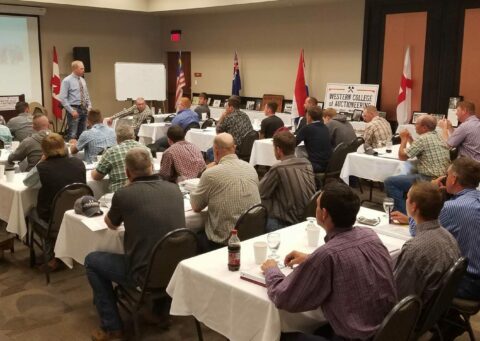What does a livestock auctioneer do?
Specializing in livestock auctions can be a very rewarding career as an auctioneer and is an important part of the livestock industry. Livestock auctioneers introduce the animals by assigned lot numbers, generate interest, and take bids. The sellers at livestock auctions are usually breeders and farmers. You will find that many of the buyers also fall into the breeder, farmer and rancher professions, although other agricultural professionals and non-professionals often take part in the auctions as well.
The majority of buyers at livestock auctions are what we consider “professional buyers” in the auction industry. The experience of both buyers and sellers in the livestock industry lends itself to a fast-paced auction chant and quick moving sale.
Aside from introducing each animal up for sale and conducting the auction itself, a livestock auctioneer may perform the following duties:
- Advertising auctions in publications, circular and media
- Meeting with sellers before the auction to discuss sale items
- Performing appraisals of the animals to calculate starting bids
- Assigning lot numbers to the animals
- Tagging the animals with identifying markers
- Directing sellers to areas for animal holding
- Pointing out the qualities and characteristics of the animal for sale, such as breed, age and weight
- Entertaining the crowd and encouraging them to bid
- Declaring winning bidders and directing them to the purchase site
- Filling out any necessary paperwork or records for finalized sales
How to become a livestock auctioneer
Interested in pursuing an auction career in the livestock industry? You can follow these steps to jumpstart your career as a livestock auctioneer:
1. Complete your education
Both Formal and Informal
In the fast-paced world of livestock auctions, your success will hinge on more than just a polished bid call. The most common level of formal education for livestock auctioneers is a high school diploma, however advanced courses or college level classes that focus on subjects like agriculture, math, finance and/or business may be beneficial. In addition, aspiring auctioneers will benefit from honing their public speaking and communication skills to foster confidence among buyers and sellers. Many of these skills are taught at auction school.
Aspiring livestock auctioneers can also benefit by getting to know the current market conditions, average sale prices in the surrounding area. Moreover, networking with breeders, ranchers, and industry professionals builds relationships, expands market knowledge, and opens doors to new opportunities. By combining formal knowledge with real-world experience, livestock auctioneers cultivate a well-rounded skillset that sets them apart in the competitive field.
2. Attend auctions
Take the time to attend livestock auctions that align with your interests. While attending auctions, you will have the chance to observe the flow of the auction and understand the pace, rhythm, and communication techniques used by experienced auctioneers. This will also give you the chance to see the unique styles of other professionals. In addition, attending auctions is a great way to gain knowledge of the physical characteristics of the livestock and the attributes that buyers are most interested in.
3. Enroll at the Western College of Auctioneering
Many employers in the auction industry prefer auctioneers who have graduated from an auction school. Our school equips aspiring auctioneers with the knowledge, skills, and legal understanding needed to succeed in this dynamic industry. Western College will provide you with specialized training in the job of an auctioneer. Depending on which of our courses you select, you can expect coursework in subjects such as bid calling, breathing techniques, filler words, elocution, marketing, appraisal, and business management.
Our livestock auctioneer training, which is part of our 85-Hour Pre-Licensing Course and Industry Fundamentals Course, specifically covers the following areas of livestock auctions:
- How to conduct a livestock auction
- Effective livestock bid calling (only available in our Hybrid Pre-Licensing Course)
- Cutting edge online and technological components of the auction industry
- Working with buyers and sellers
- Laws pertaining to livestock auctions
- Livestock contracts
- Current market trends
- Sale day operations
- Livestock auctioneering terminology
- Auction clerking and cashiering
- How to market yourself as a livestock auctioneer
- How to market your livestock auction business
4. Get apprenticed and licensed
Depending on where you live and intend to operate, you may need to acquire a license to become an auctioneer. Learn more about the license requirements by state in our resource section! To gain a full understanding of the education, and governmental requirements and regulations for getting a license, please consult your local governments licensing board.
5. Work your way up from an assistantship
In the auction industry, success starts by getting your foot in the door. Auctioneers often begin their careers as assistants, apprentices, ringmen, clerks, bid assistants, livestock sorting, etc. Consider visiting your local auction barn or talking to other auctioneers to explore the option of shadowing or finding an adjacent position. From there, you can work your way up with your employer to earn an opportunity to lead an auction. Alternatively, you can promote yourself as an independent auctioneer by contracting your services out to sale barns and auction companies. If you choose to operate as an independent contractor, you can build your reputation by starting at small auctions and advancing to larger opportunities.
Salary and job outlook for livestock auctioneers
Specific salary figures for livestock auctioneers aren’t available, but auction specialists, who perform a similar role, earn an average of $35,100 per year according to Indeed.com but range as high as $47,700.
The earning potential for livestock auctioneers depends on several factors. Many of them are independent contractors earning variable rates. Experienced auctioneers with good reputations are likely to command higher commissions and more-profitable jobs, while beginners can expect to earn less and take on less lucrative work. Though some organizations might hire auctioneers for salaried roles, many livestock auctioneers are independent contractors, hired by sellers or auction houses on a per-auction basis. Contracted livestock auctioneers normally receive a commission—a percentage of each sale or of total sales—so it’s in their interest to encourage higher bids. As an alternative or in addition to commission, a contracted auctioneer might receive one or several of the following compensations:
- Buyer’s premium: This is a percentage added to the winning bid that goes go to the auctioneer.
- Flat rate: Some auctioneers may negotiate for payment at a flat rate, ensuring they receive the agreed-upon amount regardless of gross sales at the auction.
- Hourly wage: An hourly wage ensures that the auctioneer earns a specified amount per hour of work.
Livestock auctioneer skills
The following are some essential skills for livestock auctioneers:
Subject knowledge
A livestock auctioneer must be familiar with the animals they sell and the associated terminology. The auctioneer is responsible for introducing and marketing these animals. When pointing out characteristics, they should know what traits are desirable to buyers, what constitutes a highly rated trait and what words are commonly used to describe characteristics.
Organization
Organizational skills play an important part in ensuring that an auction proceeds well. Especially for independent auctioneers, it’s important to organize tasks and logistics beforehand. These include setting up the auction block and the purchase site and discussing procedures with their assistants. During the auction, too, they should be able to keep track of the lots, the animals up for auction and the bids given.
Appraising animals for sale requires inspecting the subjects for characteristics. The auctioneer should not only know what to look for but also be attentive to minute details. Identifying easy-to-miss traits relating to such factors as muscle tone, size and demeanor can lead to accurate appraisals before an auction and marketable descriptions during.
Communication
Auctioneers use communication skills for multiple aspects of their job. During an auction, verbal competencies such as elocution, speed and interacting with crowd members. Before auctions, auctioneers using written communication skills in advertising, promoting auction events in print and online.
Performance
Performance skills refer to the ability to entertain others. Entertainment plays an important role in auctions because it helps to keep the crowd engaged and excited. This helps to encourage higher bids, which normally means a higher commission for the auctioneer.
Auctions can also last many hours, so the auctioneer must maintain a high level of energy. Stamina ensures that they don’t exhaust themselves as they continuously work to excite the audience throughout the proceedings.
Business management
Because many livestock auctioneers are independent contractors, they would benefit from having business management skills. Being able to set a prudent budget and identify strategies for generating income can help an auctioneer remain in business and turn a profit. Another example is the talent for spotting and pursuing opportunities, which can help beginner auctioneers to gain work and build their reputation.
Why Choose WCA
At Western College of Auctioneering, our livestock auctioneering sessions are taught by world champion auctioneers and industry leaders who know and understand the industry, inside and out. Upon completion of our courses, you will have a full understanding of how to conduct, manage and sell all niches of livestock at auction including purebred, sale barn, horse, sheep, hog, small animal, and cattle auctions.
Are you interested in attending Auction School to jumpstart your career in Livestock Auctions?
Western College of Auctioneering offers a number of courses that provide a better understanding of the livestock auction industry. If you are interested in learning the live bid call or intend to get an auctioneer license, our 85-Hour Pre-Licensing course is for you! Our Auction Industry Fundamentals course, a fully online offering, also provides sessions on livestock auctions.

85-Hour Pre-Licensing
Students learn all aspects of the auction industry and acquire the necessary tools to start their career.

Auction Industry Fundamentals
This course helps students dive into the business behind the auction industry.
